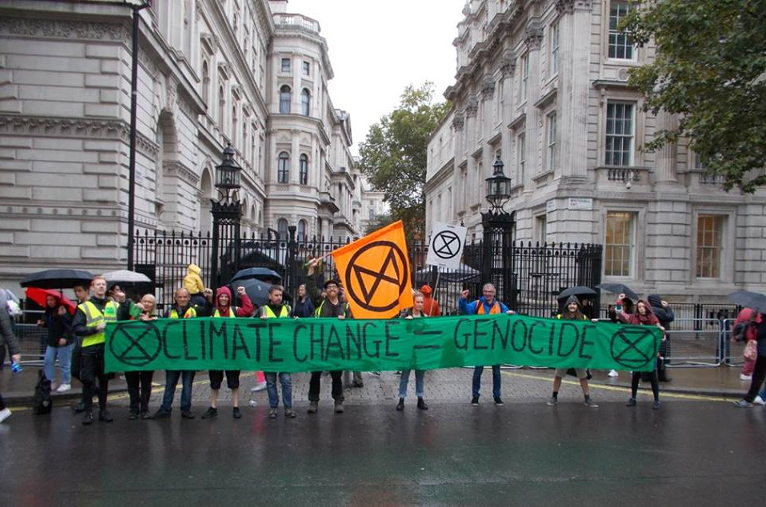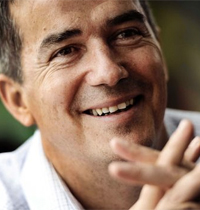The only rational response to the scientific evidence on climate change, is to declare a global emergency – to mobilise all of society to do whatever it takes to fix it. As the UN Secretary General Guterres recently stated: “We face a direct existential threat”.
Failure is really not an option when “failure” means we could “annihilate intelligent life or permanently and drastically curtail its potential” This is now a war for civilisation’s survival. [1]
Meanwhile we blunder on…. Deeply committed to making verbal commitments, while delivering pathetically inadequate actual responses. Responses that treat the clear and urgent advice of the world’s top scientists – that we face the risk of global collapse – as merely passing thoughts to be casually contemplated.
Well, time’s up. To quote Winston Churchill: “
Owing to past neglect, in the face of the plainest warnings, we have entered upon a period of danger. The era of procrastination, of half measures, of soothing and baffling expedients of delays, is coming to its close. In its place we are entering a period of consequences …We cannot avoid this period, we are in it now…”
Enter the Extinction Rebellion.
This is group of people who have simply had enough. They have looked at the science and concluded that the world has gone mad, that we now face the risk of extinction. And they’ve decided not to stand by in the face of that – but instead to rebel against the madness that has overtaken us. To try to shock us all into action, to face up to reality.
Extreme? Over-reaction? Maybe. But maybe not.
Of course, we can’t know for sure. The crucial mistake we tend to make in complicated issues like climate, is to fail on very basic risk assessment and management. We don’t know society definitely faces collapse, so we assume (or hope) it won’t and act accordingly. This is madness. If your doctor told you, “on balance I think your child will be dead in five years – I can’t be sure but the best medical science suggests a 90% likelihood. However, if you take these simple steps – steps that will be quite inconvenient and disruptive but totally doable – the likelihood of their death will fall to 5%.” What would you do? Wait for certainty? Which could only come when your child was on their death bed? Madness.
That’s the point of the Extinction Rebellion. To make us all stop and think – to ask the simple question: Am I really paying attention? To what I know, to what we all now know?
The big question is whether this will be any different from the past 30 years of climate activism. It may of course not be. We have shown an incredible ability to stay in denial about what is now asked of us. But it may also be very different. Why? I suggest five reasons.
- Civil Disobedience at (potentially) large scale.
To date most climate activism has been advocacy for policy, with a relatively small focus on direct action protests. When the latter has occurred, it has focused on specific activities e.g. Keystone and other pipelines, new coal mines. Important and often powerful, but the debate then tends to then go those particular developments, with the global climate issue as the context. Extinction Rebellion (XR) proposes something quite different. They plan civil disobedience blockades at scale – and if they get sufficient support, to shut down cities. To stop the world and make us think. It’s kind of Occupy Wall St meets the Arab Spring and Tahrir Square, but armed with the world’s top science and clear, practical and actionable solutions.
Civil Disobedience has a strong and powerful history in political and social change, including the civil rights, suffragette and peace movements and in bringing down many autocratic governments. In today’s political context, it may become a powerful, hopeful and emotionally engaging way for young people to respond to the despair and frustration they feel. XR may be flooded with people joining them. As Greta Thunberg – the Swedish 15 year old who started the School Strike For Climate said: “We’re facing an immediate unprecedented crisis that has never been treated as a crisis and our leaders are all acting like children. We need to wake up and change everything.”
- The science is now crystal clear. This is an emergency.
Civil disobedience is of course not new on climate change. At Greenpeace International in 1993 I helped organised a blockade of a key city intersection demanding the Dutch Government take action on climate change. It had little impact. Why might this be different?
This is not 1993. We have 25 years more evidence of the problem. We are also now living in the reality of a changed climate, with the process just beginning. To avoid catastrophic risk, the most recent IPCC report [2] said we have around a decade to have cut CO2 emissions by about 50%. To be clear : not a decade to start doing it, but a decade to have it done. Churchill’s “era of procrastination” is well and truly over.
- The solutions are ready.
We also have 25 years of progress in both developing and delivering solutions. In 2008, when I wrote with Professor Jorgen Randers, the One Degree War Plan, showing how we could slash emissions by 50% in five years, commencing in 2018, it was seen by many as economic fantasy. Fast forward just 10 years and we see renewables blitzing fossil fuels in the market. The most recent annual report from Lazard on the levelized cost of energy concluded: “We have reached an inflection point where, in some cases, it is more cost effective to build and operate new alternative energy projects than to maintain existing conventional generation plants”. Consider that – it is often already cheaper (and getting cheaper every year) to build and operate new renewable power plants than to just operate old (i.e. fully depreciated and paid for) fossil fuel and nuclear power plants. This is without strong policy on climate change – so imagine how fast we could move if we had it!
- The Extinction Rebellion is not alone.
This all comes on top of a growing awakening that climate change is a real emergency. Groups like The Climate Mobilization (TCM) formed by people who also faced despair but decided that telling the truth and taking action was the right response. TCM has taken the climate emergency message across the USA getting cities and towns to formally declare an emergency. They also acted in the recent US elections, which saw unprecedented engagement by young people with strong action on climate change one of their key demands. One result is that new members of Congress, like Alexandria Ocasio-Cortez, are now fully engaged in the emergency mobilizing approach.
Meanwhile, continuing to build on the intellectual basis for all this, think tanks like Breakthrough – National Centre for Climate Restoration have put forward the clear scientific case for an emergency and, I think critically, defined what an emergency mobilisation is. They explain this is not just a verbal intent to accelerate urgency and action, but a practical organising basis with clear goals, most closely referenced by the industrial transformation and economic mobilisation we saw in WWII.
Considering this growing momentum, XR might just be the tipping point.
- Nothing else we are doing is working.
My final reason this could be different is the very uncomfortable fact we in the climate movement must face. We are failing. We have built huge and widespread global support for action across policy makers, business and the public. Never has there been such engagement on the climate issue. But success cannot be defined as support for potential action. Success is slashing emissions. And on that we are failing. There are countless good reasons and justifications for this – and it’s not like millions of us aren’t trying as hard as we can. But we are still failing. And time is up.
Of course, it’s possible that Extinction Rebellion will also fail. That a few protests will gather media attention then fade away. Perhaps their deep commitment to non-violence will be disrupted by outsiders or agent provocateurs. Perhaps they will be written off as the crazy fringe, with wacky ideas about the future of democracy. All possible.
But they may also succeed. They may make enough of us ask some questions: Am I part of the problem? Am I sitting back clearly recognising the scale of the crisis and the risk of collapse, maybe even extinction, but paralysed by either fear and despair? Or just not knowing what the hell else to do? Should I join them on the streets? Is it time?
Extinction Rebellion may be the crazy fringe. Or they may be the only sane people in the room.
-
Quote from Page 13 “What Lies Beneath”. Dunlop and Spratt. Published by Breakthrough – National Centre for Climate Restoration. This report provides an excellent overview of existential threat, the climate science and why we tend to the understatement of risk on climate. https://www.breakthroughonline.org.au/publications
-
IPCC 1.5 degree report http://www.ipcc.ch/report/sr15/ Note these reductions are from 2010 levels, with the task actually greater given 2018 emissions are higher. And this is for a low level of certainty of achieving the 1.5 degree goal ( 40% – 60% likelihood ).
Teaser photo credit: Extinction Rebellion Facebook page.






